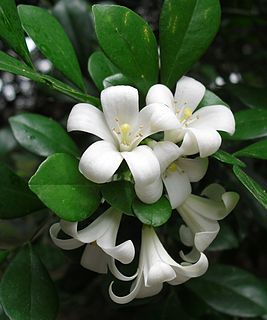
The Rutaceae is a family, commonly known as the rue or citrus family, of flowering plants, usually placed in the order Sapindales.

Melicope is a genus of about 240 species of shrubs and trees in the family Rutaceae, occurring from the Hawaiian Islands across the Pacific Ocean to tropical Asia, Australia and New Zealand. Plants in the genus Melicope have simple or trifoliate leaves arranged in opposite pairs, flowers arranged in panicles, with four sepals, four petals and four or eight stamens and fruit composed of up to four follicles.

Murraya is a genus of flowering plants in the citrus family, Rutaceae. It is distributed in Asia, Australia, and the Pacific Islands. The center of diversity is in southern China and Southeast Asia. When broadly circumscribed, the genus has about 17 species. A narrower circumscription contains only eight species, others being placed in Bergera and Merrillia.

Zanthoxylum is a genus of about 250 species of deciduous and evergreen trees, shrubs and climbers in the family Rutaceae that are native to warm temperate and subtropical areas worldwide. It is the type genus of the tribe Zanthoxyleae in the subfamily Rutoideae. Several of the species have yellow heartwood, to which their generic name alludes.

Medicosma is a genus of shrubs and trees in the family Rutaceae, all native to New Guinea, Australia or New Caledonia. They usually have simple leaves arranged in opposite pairs, flowers arranged in cymes with four sepals, four petals and eight stamens. The fruit is a follicle fused at the base in groups of up to four, each containing one or two brown or black seeds.
Thomas Gordon Hartley was an American botanist.
Boronia koniambiensis is a species of plant in the citrus family Rutaceae and is endemic to New Caledonia. It was first formally described in 1932 by Albert Ulrich Däniker then transferred to the genus Boronella in 1995 by Thomas Gordon Hartley as Boronella koniambiensis. In 2015, all the species in Boronella were transferred to Boronia on the basis of molecular phylogenetic analysis.
Limnocitrus is a genus of plant in the family Rutaceae with one species, Limnocitrus littoralis. It is native to Vietnam and Indonesia, where it is found on the island of Java in Jepara. In traditional Vietnamese medicine different parts of the plant have been used as an expectorant, antitussive product, for exudation, and the treatment of colds and fevers.
Citrus neocaledonica, synonym Oxanthera neocaledonica, the large leaf oxanthera, is a species of plant in the family Rutaceae. It is endemic to New Caledonia.
Citrus undulata, synonym Oxanthera undulata, the wavy-leaf oxanthera, is a species of plant in the family Rutaceae. It is endemic to New Caledonia.
Platydesma is a formerly recognized genus of plants in family Rutaceae. Evidence from 2009 indicated that Platydesma is nested within the genus Melicope and is sister to all Hawaiian Melicope species, and it is now placed within that genus. The other Melicope species are dioecious, whereas the flowers of species formerly placed in Platydesma are hermaphroditic, suggesting a rare evolutionary reversion away from dioecy. Species included:
Pleiospermium is a genus of plant in family Rutaceae.

Sarcomelicope is a genus of about ten species flowering plants in family Rutaceae endemic to the South Pacific. Plants in the genus Sarcomelicope are shrubs to medium-sized trees with simple leaves and flowers arranged in panicles in leaf axils, separate male and female flowers with four sepals and four petals that are free from each other and overlapping at the base. Male flowers have eight stamens that are free from each other and female flowers have four carpels that are fused, at least at the base with two ovules in each carpel. The fruit is a drupe of four carpels, partly or completely fused, and the seeds are dark brown to black.
Melicope madagascariensis is a species of plant in the family Rutaceae. It is endemic to Madagascar and is used as a medical plant.
Cyanothamnus is a genus of flowering plant in the family Rutaceae, native to Australia.
Dutaillyea is a genus of flowering plants belonging to the family Rutaceae.
Zanthoxyloideae is a subfamily of the family Rutaceae.

Bergera is a genus of flowering plants in the family Rutaceae. It has been included in Murraya as M. sect. Bergera. Species that may be placed in the genus are native from India through southeast Asia eastwards to China and Taiwan southwards to Malesia and New Caledonia. The curry tree, Bergera koenigii, is one of the better known species.
Picrella is a genus of flowering plants belonging to the family Rutaceae.






